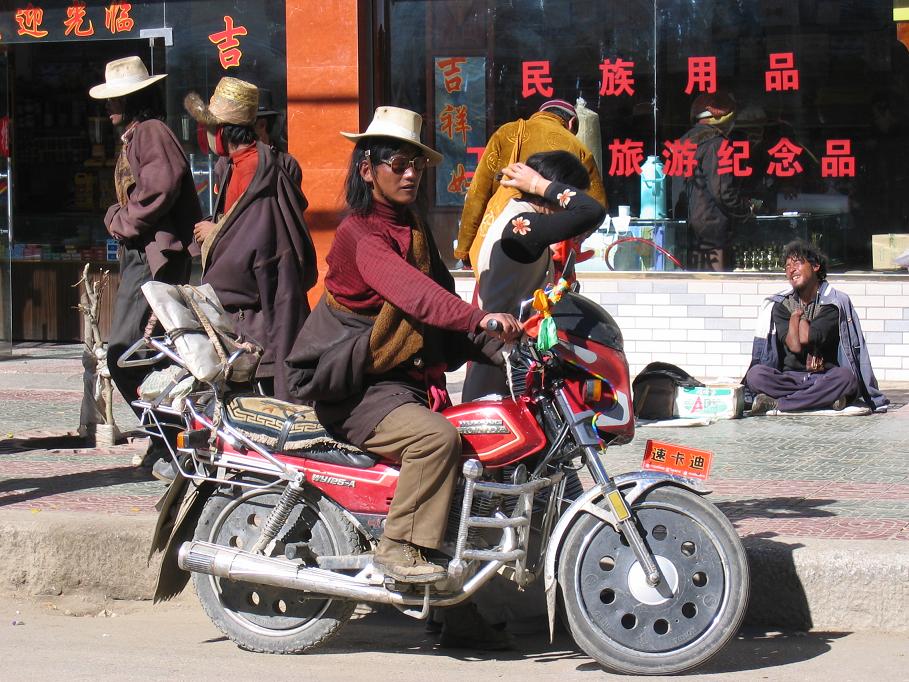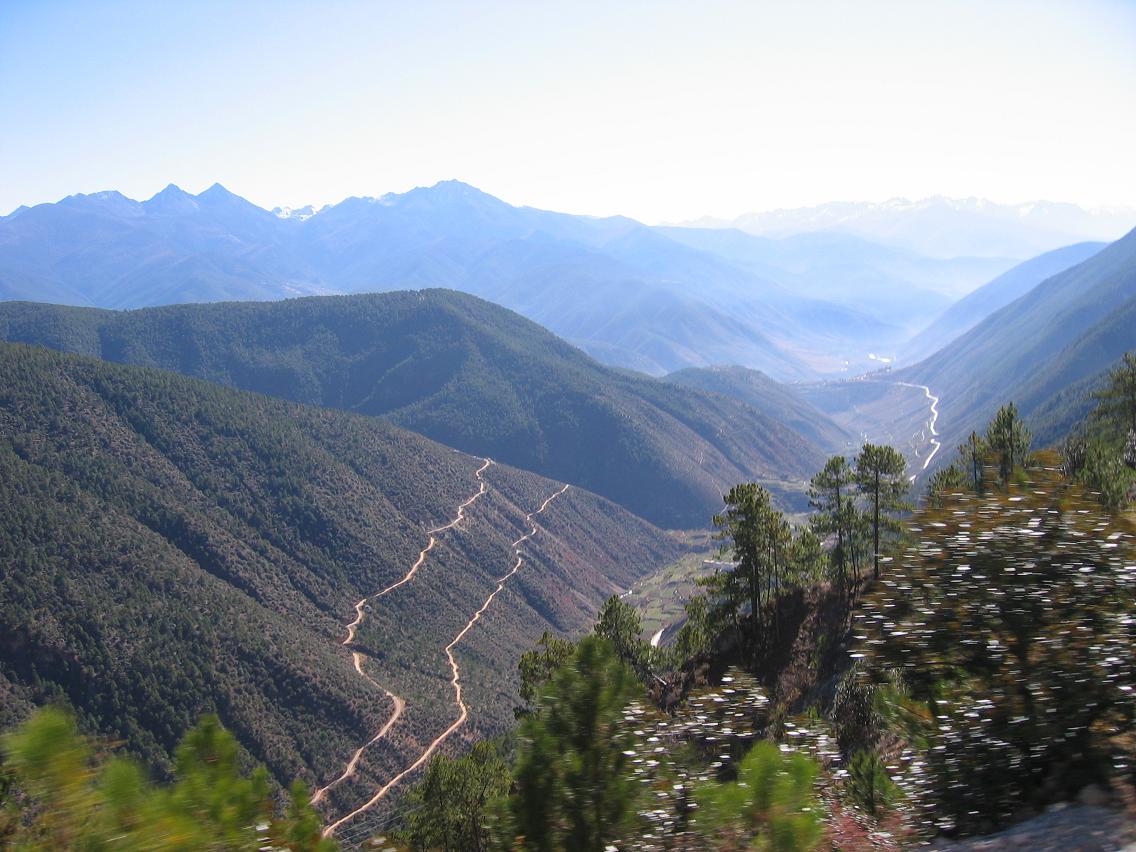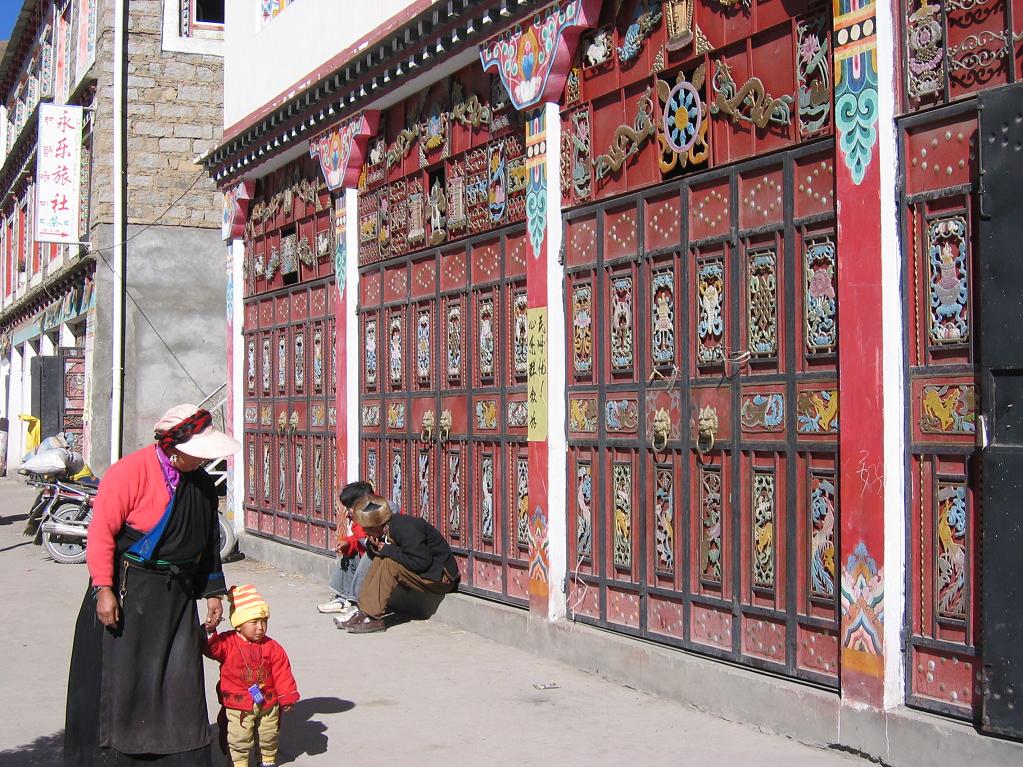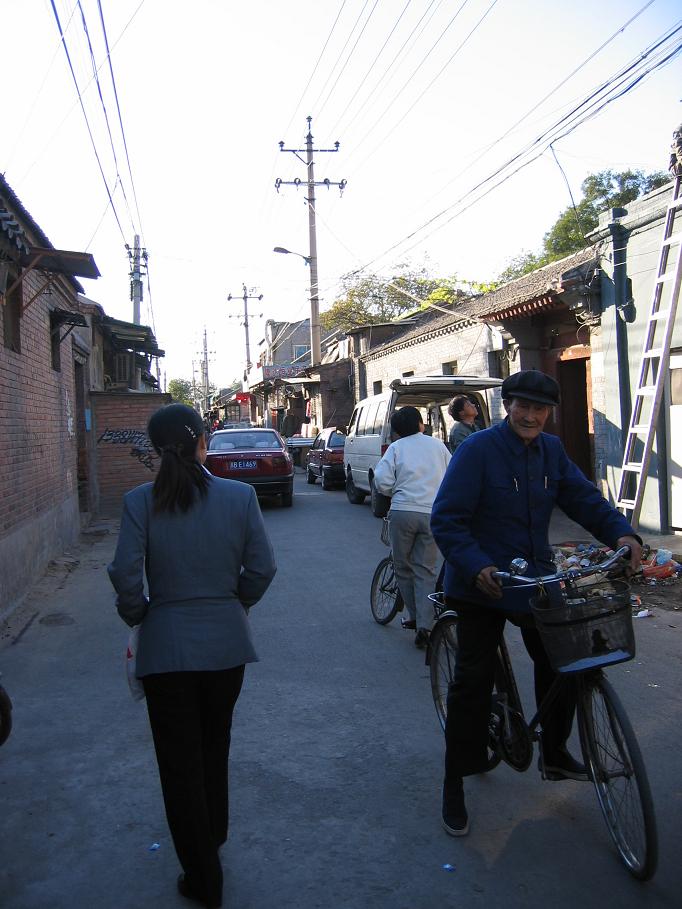The Big Squeeze - Tourism in the New China
 A week or so ago E and I sat down for lunch at a cafe in Dali's 'Old Town', one of the hot tourist destinations in China's southwest province of Yunnan. As we picked up our chopsticks and dug into our pork and noodle dishes, an audience gathered. A Chinese tour group stopped following their guide for a moment as they pointed and whispered to each other about this strange species of people before them. There we were: Westernus Backpackerus. Some pulled out their cameras, and I thought about putting out a hat and asking for tips. We have encountered this sort of interest all over China, but this was different - it was almost as if we were a photo stop on this group's city tour. I had watched Chinese tour groups go snap-happy in front of Westerners elsewhere in Yunnan province. It was not always to their liking but there wasn't much they could do about it - when it comes to tourism in the New China, Westerners are completely outnumbered.
A week or so ago E and I sat down for lunch at a cafe in Dali's 'Old Town', one of the hot tourist destinations in China's southwest province of Yunnan. As we picked up our chopsticks and dug into our pork and noodle dishes, an audience gathered. A Chinese tour group stopped following their guide for a moment as they pointed and whispered to each other about this strange species of people before them. There we were: Westernus Backpackerus. Some pulled out their cameras, and I thought about putting out a hat and asking for tips. We have encountered this sort of interest all over China, but this was different - it was almost as if we were a photo stop on this group's city tour. I had watched Chinese tour groups go snap-happy in front of Westerners elsewhere in Yunnan province. It was not always to their liking but there wasn't much they could do about it - when it comes to tourism in the New China, Westerners are completely outnumbered.
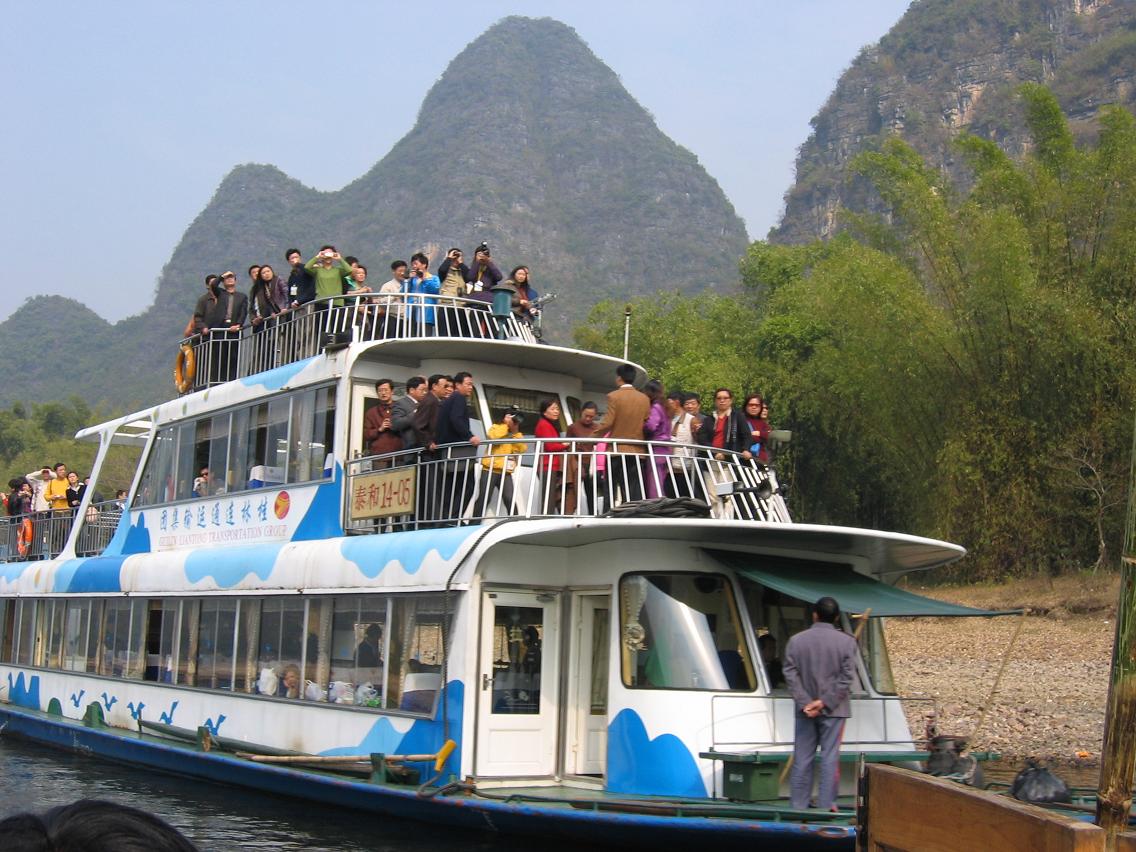 In China's growing economy, domestic tourism is booming. As disposable income increases, more and more Chinese spend their free time jetsetting to the country's hot spots. The numbers are staggering. In Dali, the owner of a cafe told us that in high season the town could expect up to 20,000 Chinese tourists coming through the town each day, compared to just 400 Westerners. And the numbers make themselves felt in all sorts of ways. Visitors to Dali can make the five hour trip to Lijiang in comfortable, modern coaches thanks to the demand provided by the Chinese middle class, whose bums are planted firmly on the seats. On the Li River, the stunning beauty of the unusual rock formations on either bank is is almost negated by the growl of large ships which transport one Chinese package tour after the other, bumper to bumper, leaving smaller tourist vessels caught in the swell. And in Yangshuo dozens of extra street stalls appear on Friday evenings to coincide with the arrival of the busloads of Chinese tourists who come to spend the weekend. And spend is probably the most appropriate word. The Chinese tour groups are known to be flush with cash, so much so that an inverted type of 'local price' applies at the riverside market: the price rockets to five times as much when the Chinese tourists arrive, and backpackers are warned to delay any shopping until they leave town.
In China's growing economy, domestic tourism is booming. As disposable income increases, more and more Chinese spend their free time jetsetting to the country's hot spots. The numbers are staggering. In Dali, the owner of a cafe told us that in high season the town could expect up to 20,000 Chinese tourists coming through the town each day, compared to just 400 Westerners. And the numbers make themselves felt in all sorts of ways. Visitors to Dali can make the five hour trip to Lijiang in comfortable, modern coaches thanks to the demand provided by the Chinese middle class, whose bums are planted firmly on the seats. On the Li River, the stunning beauty of the unusual rock formations on either bank is is almost negated by the growl of large ships which transport one Chinese package tour after the other, bumper to bumper, leaving smaller tourist vessels caught in the swell. And in Yangshuo dozens of extra street stalls appear on Friday evenings to coincide with the arrival of the busloads of Chinese tourists who come to spend the weekend. And spend is probably the most appropriate word. The Chinese tour groups are known to be flush with cash, so much so that an inverted type of 'local price' applies at the riverside market: the price rockets to five times as much when the Chinese tourists arrive, and backpackers are warned to delay any shopping until they leave town.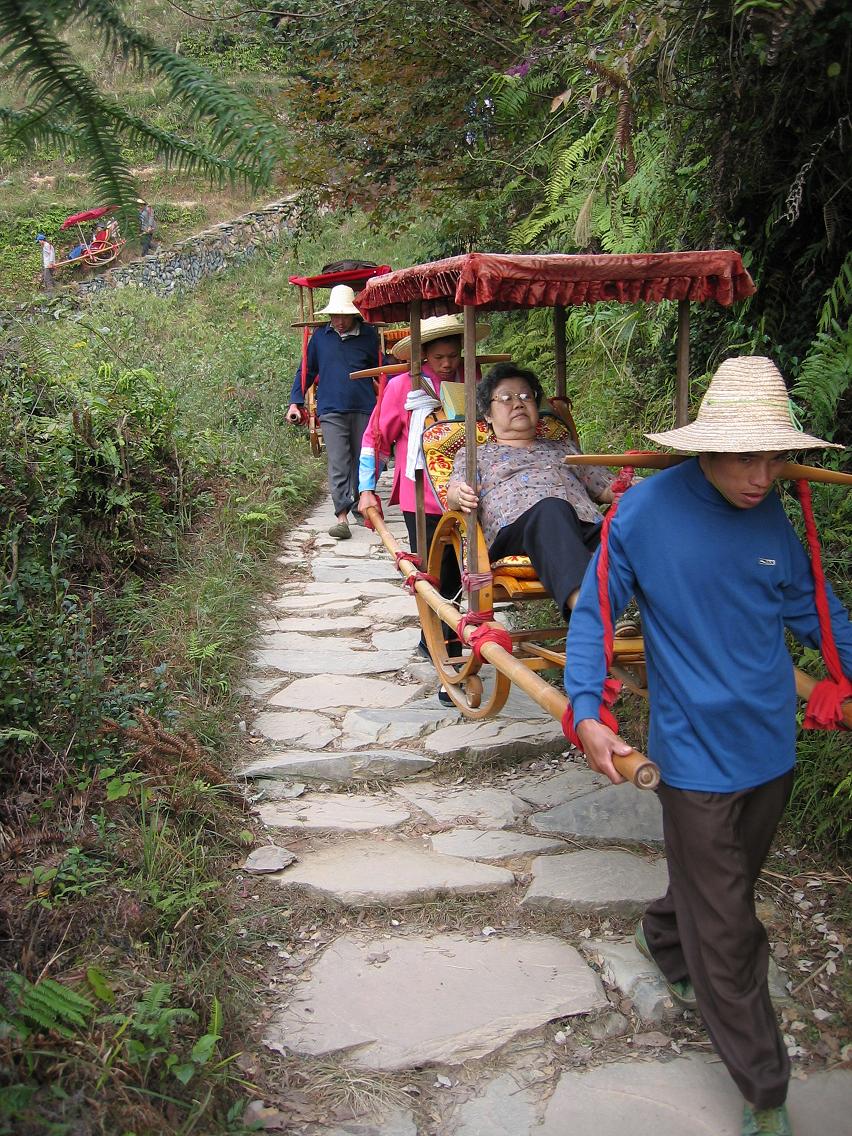 Numbers, and money, change a place. In Lijiang the beautifully restored Old Town is nothing more than a mall - most of its streets are lines of stores selling the same wall hangings, t-shirts, jewellery and other knick knacks. It is the Rocks On Speed. In Dali's Old Town, teenage store attendants wear ill-fitting full traditional dress, apparently giving us a taste of Yunnan's cultural diversity. Lijiang and Dali's Old Towns are nothing if not packed with tourists, so other cities have taken the hint and are now constructing their own 'Old Towns'. You have to take yourself on a decent walk before you meet anyone who isn't directly engaged in the tourism industry. As a tourist, the idea that you can have a truly 'authentic' cultural experience is perhaps an illusion. But in places like Lijiang and Dali, you get that empty feeling that comes when you know that you aren't even close.
Numbers, and money, change a place. In Lijiang the beautifully restored Old Town is nothing more than a mall - most of its streets are lines of stores selling the same wall hangings, t-shirts, jewellery and other knick knacks. It is the Rocks On Speed. In Dali's Old Town, teenage store attendants wear ill-fitting full traditional dress, apparently giving us a taste of Yunnan's cultural diversity. Lijiang and Dali's Old Towns are nothing if not packed with tourists, so other cities have taken the hint and are now constructing their own 'Old Towns'. You have to take yourself on a decent walk before you meet anyone who isn't directly engaged in the tourism industry. As a tourist, the idea that you can have a truly 'authentic' cultural experience is perhaps an illusion. But in places like Lijiang and Dali, you get that empty feeling that comes when you know that you aren't even close.
 In some areas, the flood of tourists has taken a particularly heavy toll. Ten years ago, Tiger Leaping Gorge was a destination for the more adventurous traveller. It is one of the world's deepest gorges, and is the site of a stunning and sometimes precarious two-day hike up and done one side of the gorge. E and I spent a gorgeous few days walking this trail, staying the night at some of the friendly guesthouses along the way. But unlike ten years ago, our route was shadowed a hundred or so metres below by an asphalt road which brings in dozens of tour buses each day. Millions of tourists now visit the gorge each year; the fume-puking buses shed their passengers at intervals for photos stops, but otherwise just sputter their way along the winding road and add to the ambience in a way that only tour buses can. On major holidays, the road becomes so clogged that passengers have to abandon their vehicles and walk until the gridlock subsides. Ten years on, the Gorge is a changed place. Unfortunately, its sad story is not over - if the dam-happy Chinese government proceeds with plans to dam the Gorge, whole villages will lose their livelihood and face forced relocation.
In some areas, the flood of tourists has taken a particularly heavy toll. Ten years ago, Tiger Leaping Gorge was a destination for the more adventurous traveller. It is one of the world's deepest gorges, and is the site of a stunning and sometimes precarious two-day hike up and done one side of the gorge. E and I spent a gorgeous few days walking this trail, staying the night at some of the friendly guesthouses along the way. But unlike ten years ago, our route was shadowed a hundred or so metres below by an asphalt road which brings in dozens of tour buses each day. Millions of tourists now visit the gorge each year; the fume-puking buses shed their passengers at intervals for photos stops, but otherwise just sputter their way along the winding road and add to the ambience in a way that only tour buses can. On major holidays, the road becomes so clogged that passengers have to abandon their vehicles and walk until the gridlock subsides. Ten years on, the Gorge is a changed place. Unfortunately, its sad story is not over - if the dam-happy Chinese government proceeds with plans to dam the Gorge, whole villages will lose their livelihood and face forced relocation.
Of course, Western tourism in China is not without its consequences (there is, after all, a Starbucks in the Forbidden City), but the numbers are too small to have the impact of Chinese holidaymakers. One of the more benign impacts of Western tourism is the flourishing of Western-style cafes throughout Yunnan. In places like Lijiang and Dali there are dozens of them, and you can be hard pressed finding an alternative place to eat if nothing on the menu takes your fancy. Luckily, they cook both Western food and Chinese food - but do neither particularly well. The Chinese food is adapted for Western palates and so is unimaginative and bland, leaving you in the peculiar situation of being unable to find authentic Chinese food in the country that invented it. And the Western food often amounts to valiant attempts at American diner fare such as burgers, burritos and pizzas. There are exceptions, but in most places there is just something not quite right about what emerges from the kitchen. My own personal theory is that a little known Sino-American treaty permits American recipes to be described once only, and on a crackly telephone line. So, for a banana pancake, the conversation might progress along the lines of "It's a sweet dish, so add lots of sugar, and put the bananas on the inside", which is relayed to Chinese kitchen staff as "Right, it's a savoury dish, so add lots of shallots, and put the bananas on top".
After just such a meal, I was wandering the streets of Yangshuo, cursing the stalls that had come out for the weekend and wondering how there could be a demand for such junk. Then up ahead I saw a DVD store with a sign advertising 'DVD player for rent'. In China a market springs up at the slightest hint of demand, and they had found my weakness. I took the shop up on its offer and spent a comfortable night in, all the while musing that, sometimes, giving the people what they want is not so bad.
Photos of Tiger Leaping Gorge, Yangshuo and Longji Rice Terraces
